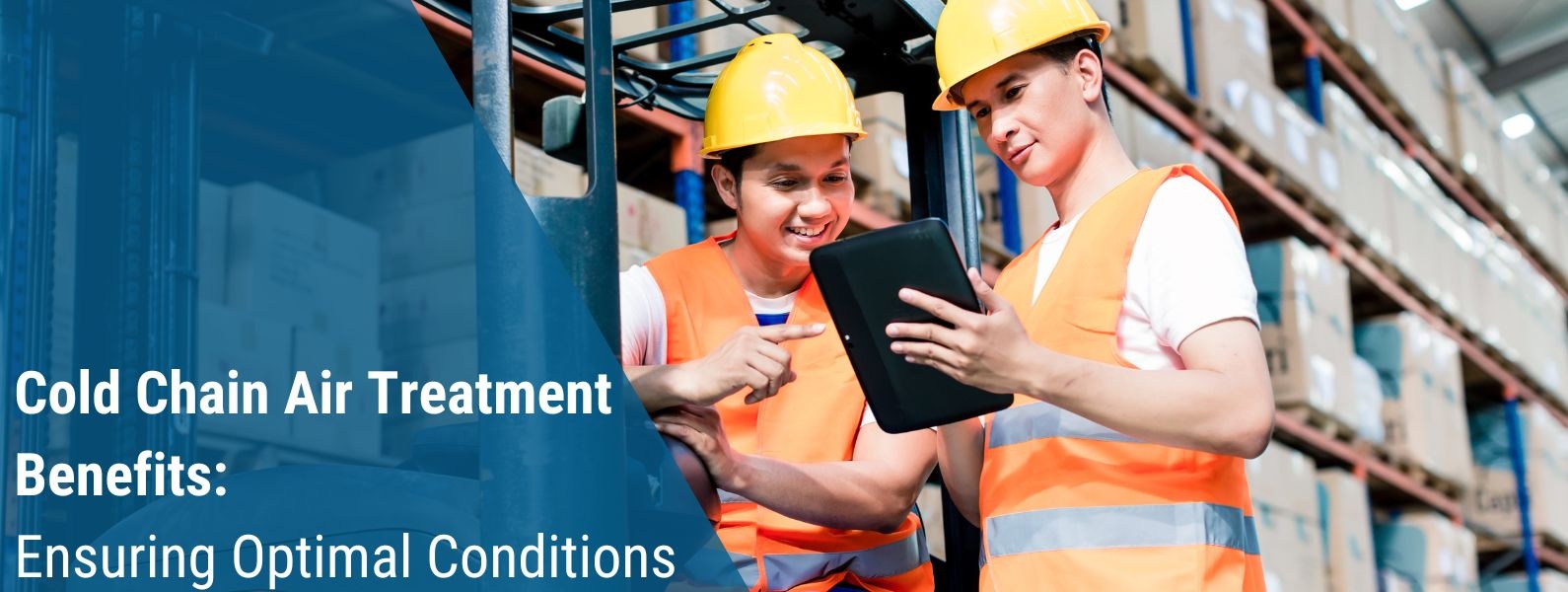Cold Chain Air Treatment Benefits: Ensuring Optimal Conditions
- Posted on
- By Praxas
- Posted in Cold Chain, Cold Chain Air Treatment, Cold Storage
- 0

In the realm of cold chain logistics, cold chain air treatment serves as a critical component in safeguarding the quality and viability of temperature-sensitive products during transportation, storage, and distribution.
What is Cold Chain Air Treatment
Cold chain air treatment refers to the process of managing and controlling the air quality and conditions within the cold chain logistics system. The cold chain encompasses the transportation, storage, and distribution of temperature-sensitive products, such as food and pharmaceuticals, that require specific temperature and humidity conditions to maintain their quality and safety. Cold chain air treatment plays a crucial role in preserving the integrity of these products throughout the supply chain.
Understanding Cold Chain Logistics
Cold chain logistics involves a complex network of activities aimed at preserving the freshness and quality of perishable goods. It begins with the proper packaging and handling of temperature-sensitive products, followed by their transportation in temperature-controlled vehicles. Once the goods reach their destination, they are stored in specialized cold storage facilities before being distributed to retailers or end consumers. Maintaining consistent temperature and humidity levels at each stage is essential to prevent spoilage, degradation, or contamination of the products.
The Importance of Air Treatment in Cold Chain Systems
Air treatment is vital in cold chain systems because temperature and humidity fluctuations can have a detrimental effect on the quality and safety of perishable goods. Cold chain air treatment helps to regulate and stabilize these conditions, ensuring that products remain within the desired temperature and humidity range. By controlling the air quality, air treatment minimises the risk of spoilage, extends the shelf life of products, and reduces the potential for bacterial growth, which can lead to foodborne illnesses or compromised efficacy of pharmaceuticals.
Maintaining Optimal Conditions in Cold Storage Facilities
Cold storage facilities are critical components of the cold chain, providing a controlled environment for the storage of temperature-sensitive products. Proper air treatment is essential to maintaining optimal conditions within these facilities. Cold storage rooms utilise refrigeration systems and air circulation mechanisms to regulate temperature and humidity levels. The air treatment systems help to distribute cooled air evenly, prevent condensation, and remove excess moisture, ensuring that products are stored in a consistently controlled environment.
The Role of Temperature and Humidity Control in Cold Chain Air Treatment
Temperature and humidity control are key aspects of cold chain air treatment. Temperature fluctuations can cause product degradation or compromise their efficacy, while high humidity levels can lead to moisture-related issues like mould growth or packaging damage. Cold chain air treatment systems employ precise temperature and humidity sensors to monitor the air conditions alongside desiccants to control moisture levels and Ethylene Filters to reduce spoilage. Data loggers are an invaluable tool to monitor the temperature and humidity levels that goods are exposed to throughout their cold chain journey.
Energy Efficiency in Cold Chain Air Treatment
Energy efficiency is an important consideration in cold chain air treatment systems. Given the large-scale operations and energy-intensive nature of cold storage facilities and transportation vehicles, optimising energy consumption is crucial. Advancements in air treatment technologies, such as improved insulation, energy-efficient refrigeration systems, and smart controls, have significantly reduced energy consumption in cold chain logistics. These innovations not only help to minimise operational costs but also contribute to environmental sustainability. Data loggers can provide the historical data needed to analyse and optimise cold chain processes.
Enhancing Food Safety Through Cold Chain Air Treatment
Cold chain air treatment plays a vital role in enhancing food safety by reducing the risk of spoilage, contamination, and foodborne illnesses. By maintaining optimal temperature and humidity conditions, air treatment systems prevent the growth of harmful bacteria, viruses, and moulds that can thrive in unfavourable environments. This ensures that perishable goods, such as fresh produce, dairy products, and meats, reach consumers in a safe and wholesome state, free from potential health hazards.
The Impact of Cold Chain Air Treatment on Pharmaceutical Products
In the pharmaceutical industry, maintaining the efficacy and stability of drugs is of utmost importance. Cold chain air treatment is crucial for preserving the quality and integrity of pharmaceutical products, especially those that are temperature-sensitive or require strict storage conditions. Proper air treatment ensures that medications are stored within the specified temperature range, protecting their chemical composition and therapeutic properties. This is particularly critical for vaccines, biologics, and other sensitive pharmaceuticals.
Technological Advancements in Cold Chain Air Treatment
Technological advancements have revolutionised cold chain air treatment, offering more precise control and monitoring capabilities. IoT (Internet of Things) sensors and cloud-based monitoring systems enable real-time tracking of temperature and humidity levels throughout the cold chain. This provides valuable data for analysis and optimisation of air treatment processes. Additionally, innovations such as advanced insulation materials, energy-efficient compressors, and intelligent airflow management systems have improved the overall efficiency and reliability of cold chain air treatment.
Challenges in Implementing Cold Chain Air Treatment
Implementing effective cold chain air treatment systems comes with its challenges. One significant challenge is the need for consistent temperature and humidity control across the entire cold chain, which involves coordination among various stakeholders, including manufacturers, distributors, and retailers. Proper training and education are essential to ensure that all personnel involved understand the importance of air treatment and adhere to best practices. Additionally, investments in infrastructure, equipment, and technology may be required to meet the specific air treatment needs of different products and environments.
Best Practices in Cold Chain Air Treatment
To achieve optimal results, several best practices should be followed in cold chain air treatment. These include regular maintenance and calibration of air treatment equipment, ensuring proper airflow and ventilation in storage facilities, and employing redundancy measures to minimise the risk of system failures. It is also crucial to establish comprehensive monitoring and quality assurance protocols to detect any deviations in temperature or humidity and take prompt corrective actions.
Economic and Environmental Implications of Cold Chain Air Treatment
Cold chain air treatment has both economic and environmental implications. On the economic front, proper air treatment helps to minimise product loss due to spoilage or degradation, reducing financial losses for manufacturers, distributors, and retailers. Additionally, by extending the shelf life of perishable goods, air treatment systems enable better inventory management and reduce wastage. From an environmental standpoint, efficient cold chain air treatment contributes to energy conservation and reduces greenhouse gas emissions, making the cold chain industry more sustainable and environmentally friendly.
Maximizing the Benefits of Cold Chain Air Treatment with Praxas
Praxas is a leading provider of cold chain solutions and air treatment solutions. With their expertise and innovative technologies, Praxas helps businesses optimise their cold chain operations and ensure the highest level of product quality and safety. Praxas' comprehensive approach encompasses tailored air treatment solutions, monitoring systems, and ongoing support to meet the unique needs of each customer. By partnering with Praxas, businesses can maximise the benefits of cold chain air treatment and gain a competitive edge in the market.
In conclusion, cold chain air treatment plays a crucial role in maintaining optimal conditions for temperature-sensitive products throughout the cold chain logistics system. By controlling temperature and humidity, air treatment systems enhance food safety, preserve pharmaceutical efficacy, and reduce product loss. Technological advancements have improved the efficiency and reliability of cold chain air treatment, while best practices and proper training help overcome implementation challenges. Ultimately, with the right air treatment solutions, businesses can optimise their cold chain operations, ensure product integrity, and achieve economic and environmental sustainability.
For PDF click here


Comments
Be the first to comment...